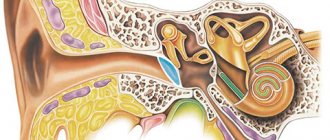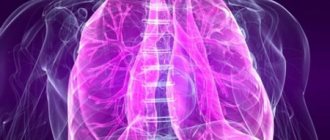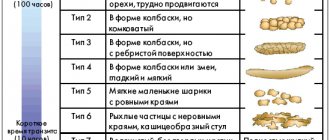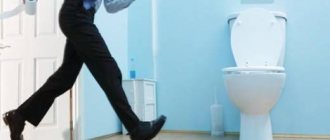Constipation is a disorder of the intestines, which is expressed by retention of stool for more than 48 hours or incomplete bowel movements during bowel movements. This condition is not a disease, but a symptom that indicates an incorrect lifestyle or the presence of pathologies.
Constipation can occur in anyone, regardless of their health. It can be caused by stress, the inclusion of incompatible foods in the diet, poor nutrition, and drinking a small amount of liquid. If this is a one-time occurrence, then most likely there is no cause for concern. However, if constipation recurs frequently or becomes chronic, you should consult a doctor, as they may be a symptom of pathologies. Make an appointment at the Otradnoe Polyclinic, undergo all the necessary examinations and receive comprehensive advice on lifestyle changes to eliminate intestinal problems.
From this article you will learn about the types of constipation, their causes and treatment. Since this condition can lead to complications, it should not be taken lightly.
Constipation symptoms
The symptoms of constipation depend on its causes, duration and bowel conditions.
For acute constipation
There is no stool for several days, which may be due to mechanical (with an intestinal tumor) or dynamic obstruction (with inflammation, diverticulitis).
Constipation during tumor processes increases over several weeks and is accompanied by intoxication. Inflammatory diseases of the abdominal organs may cause abdominal pain and fever.
With hemorrhoids or anal fissure, pain and bleeding from the rectum may occur.
For chronic constipation
Chronic constipation can be diagnosed when 2 or more of its symptoms are detected during 12 weeks in the last 6 months:
- spontaneous bowel movements less than three times a week,
- dense feces (formation of “sheep” or “goat” feces),
- feeling of incomplete bowel movement,
- the need to forcefully cleanse the intestines,
- severe straining during defecation.
Chronic constipation is also often accompanied by bloating, aching, bursting or cramping pain. Belching and an unpleasant taste in the mouth may occur.
General intoxication gradually develops with symptoms such as headache, sleep disturbances, irritability, depression, fatigue and others.
Medical definition of coprostasis
Even experts cannot yet decide what to consider coprostasis: an independent disease or a symptom of other diseases. WHO (World Health Organization) classifies it as a disease, and the world's leading gastroenterological associations insist that coprostasis should be considered as a symptom.
Acute constipation in medicine is the absence of bowel movements for a long period - at least 2 days. It can appear at any age: from infancy to old age.
Causes and mechanisms of development of constipation
Many reasons trigger the mechanisms for the development of constipation:
- Colon motility disorders. Moreover, at first they develop according to the type of hypermotility, after which peristalsis and tone of the colon weaken.
- Reduced urge to have bowel movements.
- Disorders of the anatomy of the colon or neighboring organs that interfere with the normal movement of feces.
- Discrepancy in the volume of feces and large intestine.
Let's look at the causes of constipation.
Doctors are more likely to encounter functional constipation, which can result from:
- external factors that inhibit the natural urge to defecate: unfavorable environment (for example, during travel), disturbances in sleep and work patterns, personality traits (difficulties when using a public toilet, when visiting, etc.).
- Dietary habits: lack of plant fiber in food, certain types of foods (cheese and others).
- A sedentary lifestyle or bed rest due to illness leads to muscle weakness, including the abdominal muscles and smooth muscles of the intestines, which is why hypodynamic constipation develops.
- Hormonal disorders: hypofunction (insufficient production of hormones) of the thyroid gland, pituitary gland diseases, diabetes mellitus, increased production of progesterone during pregnancy.
- Long-term use of certain medications. Cleansing enemas and laxatives can also cause constipation.
- Fear of pain with hemorrhoids or fissures also leads to impaired bowel movements and constipation.
Organic (mechanical) constipation can be caused by the following reasons:
- neoplasms in the intestines;
- scars and, as a result, narrowing of the intestinal lumen;
- congenital anomalies (elongation, sharp narrowing, violations of intestinal fixation, etc.).
Classification
Constipation is classified according to the etiological factor and mechanism of development:
- nutritional
(related to dietary characteristics) - neurogenic
(caused by disorders of neuro-reflex activity) - psychogenic
(related to psycho-emotional state) - constipation in anorectal diseases
(hemorrhoids, anal fissure, paraproctitis) - toxic
(poisoning with lead or mercury, certain medications, chronic intoxication) - proctogenic
(associated with functional disorders of the pelvic floor diaphragm muscles) - constipation due to mechanical obstructions
(tumors, strictures, scar changes, polyps, abnormalities of the digestive tract) - Iatrogenic
constipation (as a result of taking medications).
Complications of chronic constipation
The most common complication, which entails the others, is stagnation and compaction of feces in the intestines, the so-called coprostasis. Elderly patients and those who are on bed rest for a long time suffer from it especially.
Later you may experience:
- haemorrhoids;
- intoxication of the body with the appearance of nausea, vomiting;
- inflammation of the large intestine;
- urinary retention and kidney dysfunction due to pressure from the rectum on the bladder;
- atony or “lazy” bowel – the inability to empty yourself due to frequent use of enemas and laxatives;
- mechanical intestinal obstruction and peritonitis are the most serious complications that require immediate surgical intervention.
Obviously, constipation is a condition that requires serious treatment and timely consultation with a doctor.
When and who to contact for constipation
If constipation begins to recur periodically, and laxatives are already in your home medicine cabinet, you should schedule a visit to the doctor. Timely diagnosis will help identify the cause of the disease. The doctor will prescribe adequate treatment that will alleviate the condition and avoid complications.
You can seek help from a proctologist, therapist or gastroenterologist who diagnoses and treats diseases of the digestive system. Do not put off visiting a doctor if constipation is accompanied by abdominal pain, intoxication and other symptoms. This condition may require urgent medical attention.
Prevention
It is better to prevent stool retention than to treat it, since constipation is dangerous for the entire body. First of all, you need to adjust your diet. Avoid eating before bed. To maintain the tone of the abdominal muscles, physical activity is necessary. Light exercise in the morning will invigorate you and help avoid digestive problems. You can do special exercises aimed at tensing and relaxing the abdominal muscles.
Stress affects the body. If you cannot avoid stressful situations or nervous tension, you need to learn to cope with problems with minimal losses. You may need the help of a psychologist.
Stool retention causes serious consequences and changes in the body. You should not neglect the symptom, even if it does not bother you much and does not appear often. Sometimes the causes of the pathology can be so dangerous that, if the doctor does not intervene in a timely manner, they lead to death. At the slightest suspicion of diseases of the gastrointestinal tract, you should consult a doctor.
Diagnosis of constipation
During your initial visit, the doctor will conduct a full examination, ask about your medical history, concomitant diseases and find out hereditary factors, analyze your eating and behavioral habits, and then prescribe an additional examination.
The list of diagnostic procedures includes:
- Digital examination of the rectum;
- Sigmoidoscopy - examination using a sigmoidoscopy device allows you to determine the presence of hemorrhoids, fissures, and neoplasms of the rectum;
- Laboratory tests: general blood and urine analysis, blood biochemistry, stool tests (coprogram, stool occult blood test and bacterial culture);
- Additional instrumental studies: Ultrasound of the abdominal organs, irrigoscopy - X-ray examination of the intestines using a contrast agent to determine the time of passage of food through the gastrointestinal tract and other features, colonoscopy - examination of the large intestine using an endoscope, a biopsy of the mucous membrane is also possible (sampling a piece of tissue);
- Special studies to determine the condition of the sphincters and pelvic floor muscles;
- Consultations with related specialists – endocrinologist, gynecologist.
If no organic causes of constipation are found, the doctor diagnoses “functional constipation” and chooses the appropriate treatment tactics.
general description
Constipation itself consists of a significant and sudden decrease in the frequency of bowel movements from the contents accumulating in it under the influence of certain reasons; similarly, we can talk about a complete absence of bowel movements. Most often, this type of reason is considered to be an incorrect lifestyle or dietary habits, which also provoke this disorder.
A deviation in the examination of bowel habits, subsequently defined as constipation, is bowel movement, which is observed in patients less than three times a week. Another characteristic feature of constipation is that the stool with it is characterized not only by its own rarity, but also by excessive hardness with a meager volume of excreted feces.
The consistency of stool is determined based on the amount of water in it. If, for example, we are talking about solid stool, then its amount is within 40%, while normal stool contains about 70% water in its composition, and liquid stool - about 95%. As an objective criterion in considering constipation and confirming it as a diagnosis, the mass of feces excreted, not exceeding 35 grams per day, is also considered. The clinical picture can also be supplemented by difficulty in defecation, a feeling of discomfort in the abdomen, as well as a feeling of incomplete bowel movement. Basically, constipation is a chronic phenomenon, although its sudden development is also possible.
Features of bowel movement
Treatment of constipation
Therapeutic measures begin with emptying the intestines using an enema or lactulose drug. The treatment regimen is developed individually depending on the causes, duration of constipation, your age and condition.
The doctor may recommend:
- diet changes: eating foods with a lot of fiber, increasing the daily volume of fluid to at least 2 liters per day, taking dietary bran;
- drug therapy:
- laxatives (herbal or synthetic) with gradual dose reduction and withdrawal;
- — prebiotics – to normalize intestinal flora;
- - antispasmodics;
measures to treat a disease whose symptom is constipation.
Treatment is aimed at restoring normal bowel movements and bowel functions, improving quality of life and preventing complications.
Diet is the basis of the fight against disease
Without changing your usual diet, treating constipation makes no sense. If you continue to eat dry food and irregularly, you will never get rid of problems with stool. First of all, doctors recommend eliminating foods that cause constipation. This is fatty meat, pasta, confectionery.
You should follow a certain diet and eat strictly at certain hours. It is necessary to include foods containing fiber in your diet. First of all, these are raw vegetables and fruits. Fiber is not fully absorbed by the body, but it increases the volume of stool and promotes its movement through the intestines. It is useful to include bran, buckwheat porridge, seaweed and lean meat in your diet. It is better to avoid alcohol and carbonated drinks. It is important to maintain the correct drinking regime. It is recommended to drink up to two liters of clean water per day. Lack of fluid can cause stool to harden and cause severe constipation. What to do if you can’t eat at a certain time? In this case, doctors recommend preparing food in advance and taking it to work in containers. After about 2-4 weeks of such nutrition, you can feel the first positive results of treatment.
Constipation in infants and young children
The development of constipation in children is possible from the first days of life. This is one of the most common complaints that mothers present to the pediatrician. The fact is that the intestines still continue to form after birth, they are populated by microflora, and digestion capabilities are very limited.
As you grow older, the problem of constipation may worsen. This is evidenced by data from pediatric gastroenterologists: up to 50% of children continue to suffer from constipation in the next 5 years of life, and in 25% constipation persists into adulthood.
The concept of constipation in infants is quite vague, so parents do not always seek help in time.
When breastfeeding, the frequency of stool can correspond to the number of feedings, and the stool should be mushy. With artificial feeding, the norm is considered to be stool once a day, with a break of no more than 24 hours. Having lumps or hard stools is also considered a sign of constipation.
Additional symptoms of constipation in young children include abdominal pain, sleep and appetite disturbances, restlessness, crying, bloating and pain. 95% of constipation in children is functional.
An accurate diagnosis and treatment is prescribed by a pediatrician or pediatric gastroenterologist. Timely help with constipation is very important for the full growth and development of the child.
Our boarding houses
Golitsyno
Minsky
Liquid treatment
Dehydration leads to caking of masses in the colon. One of the most effective methods to help cope with this unpleasant age-related change is ordinary clean water at room temperature. It is enough to drink more of it to normalize bowel movements. This works well if the difficulties have not yet become serious. One glass is enough, which should be consumed in small sips, half an hour before meals.
Vegetable oil
What to take for constipation in older people - a tablespoon of flaxseed, olive or any other refined substance. A tablespoon a few minutes before starting a meal is enough to get rid of even the most stubborn blockage. In addition, the beneficial microelements in their composition have an excellent effect on the functioning of the gastrointestinal tract. Add neat to salads and ready-made dishes.
Leave a request for selection of a boarding house
for an elderly person
Vegetable juices
Another way to forget about the problem is to drink cabbage, carrot, cucumber or beetroot drink. Can be mixed in different proportions and consumed twice a day. The main thing is that there are no contraindications, including gastritis or stomach ulcers.
If constipation occurs in older women, then you already know what to do. But it is better to use this method under the attention of a specialist.
Dried fruits
Dates, prunes, raisins and dried apricots cleanse the intestines. The only negative is that it is undesirable to take them in large quantities in case of diabetes or borderline conditions.
Rhubarb
One of the most effective remedies, it copes even with acute or prolonged stagnation.
The dried root of the plant in the amount of two tablespoons is poured with 250 ml of boiling water, infused and, after filtering, drunk 50 milliliters at night.
But remember that it is addictive and is not recommended for a number of diseases, such as gout, cholecystitis, rheumatism.











